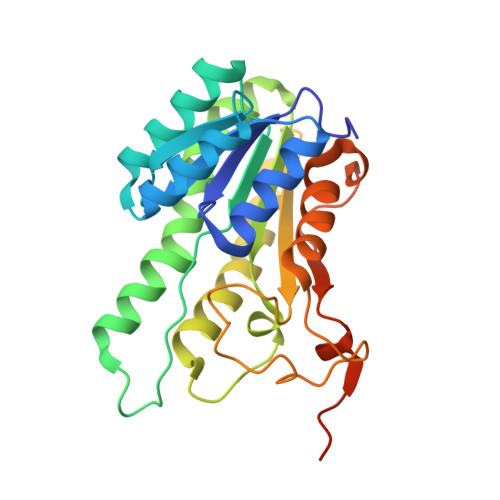Directed evolution approach to a structural genomics project: Rv2002 from Mycobacterium tuberculosis
Yang, J.K., Park, M.S., Waldo, G.S., Suh, S.W.(2003) Proc Natl Acad Sci U S A 100: 455-460
- PubMed: 12524453
- DOI: https://doi.org/10.1073/pnas.0137017100
- Primary Citation of Related Structures:
1NFF, 1NFQ, 1NFR - PubMed Abstract:
One of the serious bottlenecks in structural genomics projects is overexpression of the target proteins in soluble form. We have applied the directed evolution technique and prepared soluble mutants of the Mycobacterium tuberculosis Rv2002 gene product, the wild type of which had been expressed as inclusion bodies in Escherichia coli. A triple mutant I6TV47MT69K (Rv2002-M3) was chosen for structural and functional characterizations. Enzymatic assays indicate that the Rv2002-M3 protein has a high catalytic activity as a NADH-dependent 3alpha, 20beta-hydroxysteroid dehydrogenase. We have determined the crystal structures of a binary complex with NAD(+) and a ternary complex with androsterone and NADH. The structure reveals that Asp-38 determines the cofactor specificity. The catalytic site includes the triad Ser-140Tyr-153Lys-157. Additionally, it has an unusual feature, Glu-142. Enzymatic assays of the E142A mutant of Rv2002-M3 indicate that Glu-142 reverses the effect of Lys-157 in influencing the pKa of Tyr-153. This study suggests that the Rv2002 gene product is a unique member of the SDR family and is likely to be involved in steroid metabolism in M. tuberculosis. Our work demonstrates the power of the directed evolution technique as a general way of overcoming the difficulties in overexpressing the target proteins in soluble form.
- Structural Proteomics Laboratory, School of Chemistry and Molecular Engineering, Seoul National University, Seoul 151-742, South Korea.
Organizational Affiliation:


















